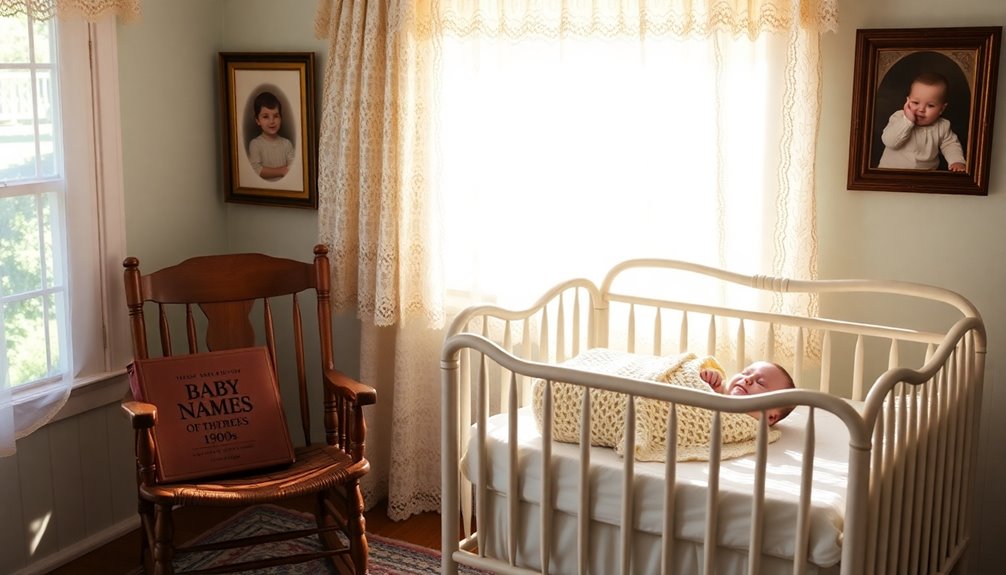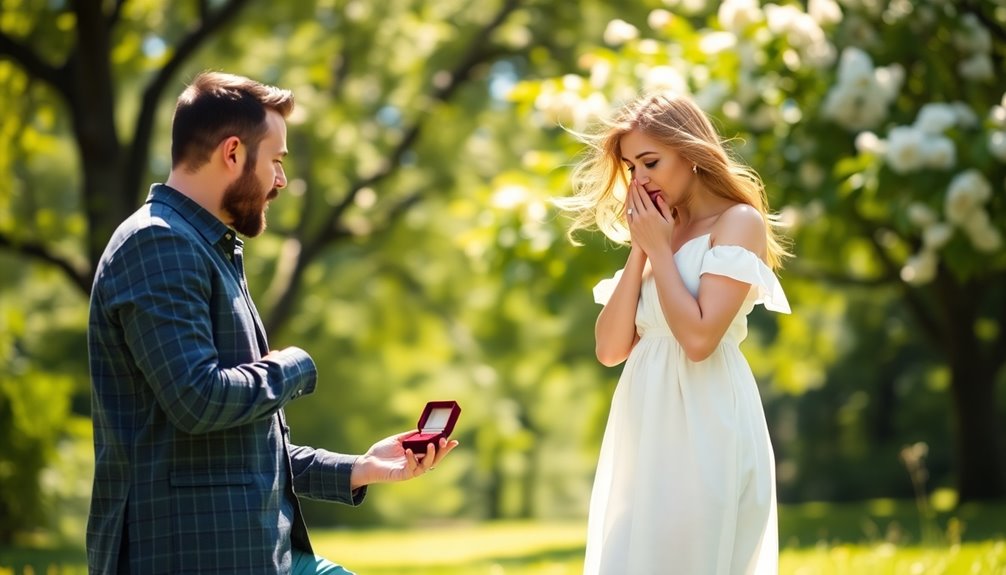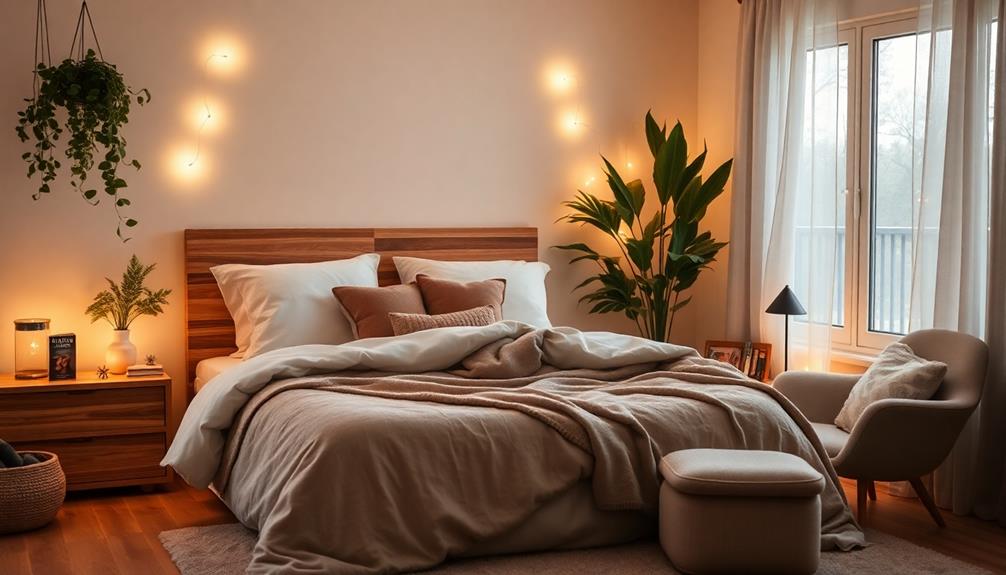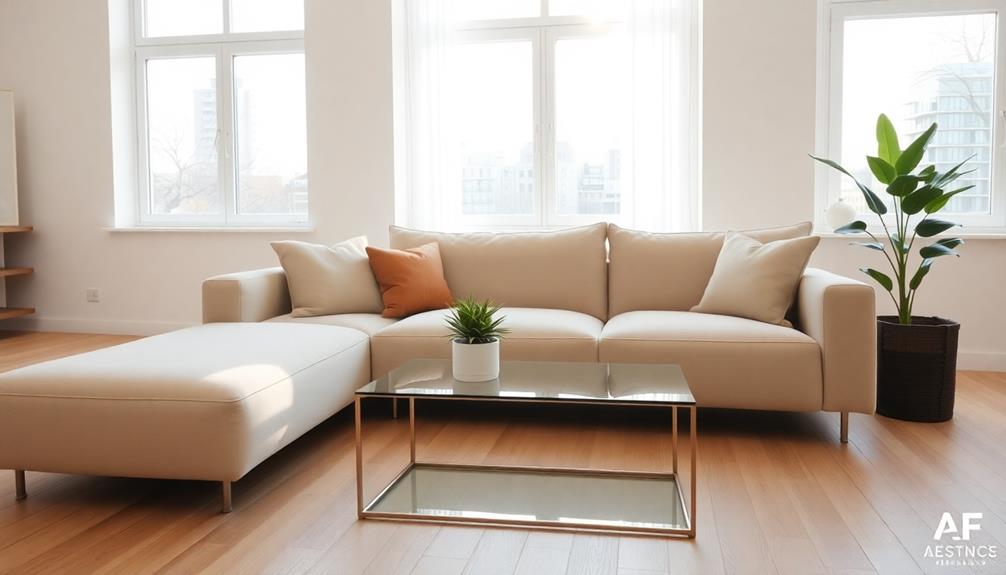Old-fashioned boy names from the 1800s are making a strong comeback, and you'll find vintage classics like Theodore and Henry capturing the spotlight. These names evoke nostalgia, connecting your child to rich family histories. Parents are increasingly drawn to unique choices like Percival and Ambrose, reflecting individuality and charm. Short, memorable names such as Eli and Leo are also on the rise, appealing for their simple elegance. As trends shift towards names that blend tradition with modern relevance, you might be intrigued to discover even more retro classics that are trending today.
Key Takeaways
- Vintage names like Theodore, Henry, and Arthur are regaining popularity, reflecting a nostalgic connection to the past.
- Unique 1800s names such as Ambrose, Percival, and Silas offer originality while maintaining historical significance.
- Short and sweet names like Eli, Max, and Gus are favored for their simplicity and ease of pronunciation.
- The resurgence of biblical names like Ezra and Samuel highlights a revival of vintage Hebrew names with deep meanings.
- Parents are increasingly drawn to names that evoke emotional resonance and reflect their family heritage and values.
Popular Old-Fashioned Boy Names

Old-fashioned boy names are often making a strong comeback, capturing the hearts of new parents. You might notice vintage baby names like Theodore and Arthur rising in popularity, with Theodore impressively ranking in the Top 10 since 2021. Names such as Henry and Oliver have also returned, with Henry sitting at number 8 and Oliver enjoying global appeal.
As you explore options, consider names like Franklin and Gideon, which are trending due to their charming old-fashioned vibe while still feeling fresh. You might even be intrigued by unique Victorian names like Cornelius and Percival, reflecting a desire for distinctive yet historical choices for boys.
The nostalgic appeal of retro classics is evident, particularly with names like Mac, which climbed an astonishing 260 spots in 2021. This resurgence showcases a growing trend among parents who want to blend traditional roots with modern relevance.
If you're looking for a name that stands out yet carries a timeless essence, these popular old-fashioned baby names could be just what you need for your little one. Embrace the charm of the past while giving your child a name that feels both classic and current.
Vintage Names Gaining Popularity
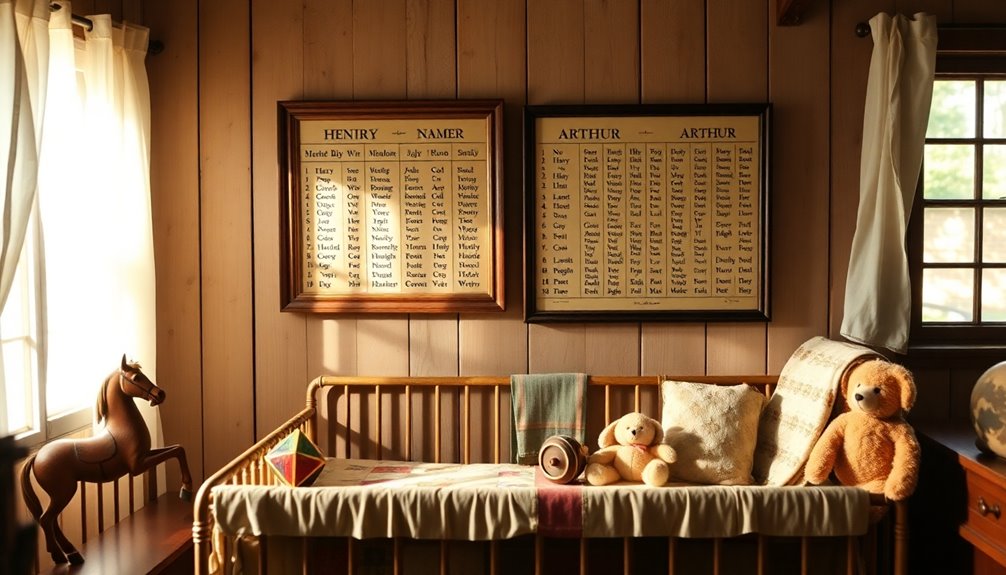
Vintage boy names are capturing the spotlight as parents increasingly seek names that blend nostalgia with uniqueness. You might notice a resurgence of old-fashioned favorites like Arthur and Theodore, with Theodore making its way into the Top 10 since 2021. Similarly, Henry and Oliver have also shown impressive comebacks, with Henry currently sitting at number 8 in the latest rankings.
This revival of vintage names highlights a growing appreciation for their timeless appeal. Parents often favor historical names to evoke a sense of nostalgia and heritage, creating a meaningful connection to the past. Additionally, the trend towards minimalist lifestyles has influenced many parents to choose names that reflect simplicity and elegance. The significance of these names often lies in their cultural heritage, providing a deeper sense of identity and belonging. Furthermore, choosing vintage names can foster an environment of emotional alignment, contributing to a child's sense of self-worth and connection.
You may find that unique vintage names like Cornelius and Percival are also gaining traction, reflecting a broader trend toward distinctive yet classic choices. Awareness of these pitfalls can help parents choose names that resonate positively with their values and aspirations.
Cultural shifts play a significant role in this naming renaissance, as many parents are keen to honor family traditions and historical significance. In a world where everyone wants their child to stand out, these old-fashioned names are making a comeback, offering a blend of familiarity and individuality. Embracing these vintage names can give your child a strong and stylish identity rooted in history.
Unique and Rare Choices
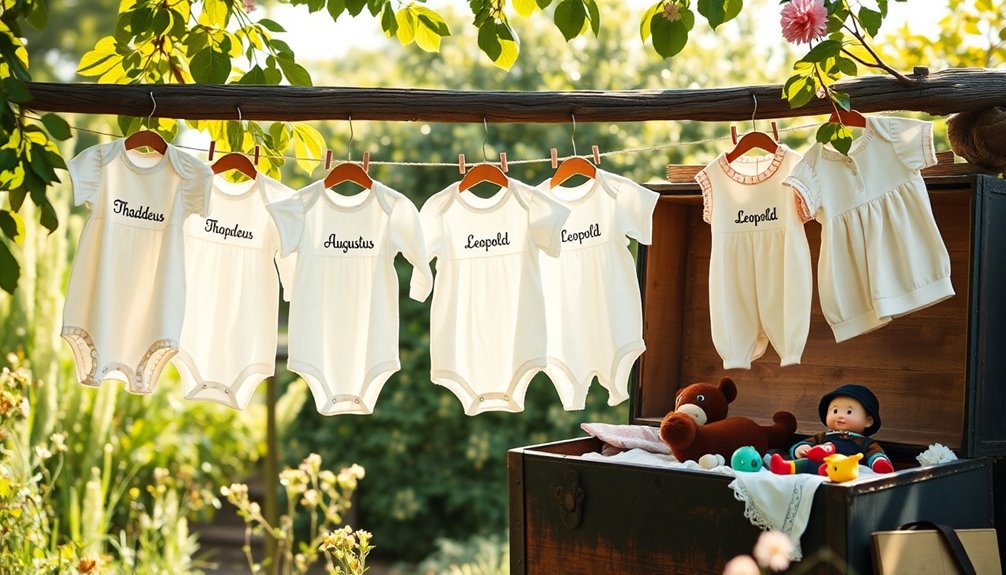
As parents immerse themselves in the world of baby names, they're increasingly drawn to unique and rare choices that offer a distinct identity for their children. Old names like Ambrose and Percival are making a comeback, reflecting a desire for individuality. These names, once popular in the 1800s, now stand out in modern naming trends, making them alluring options for today's parents. Names such as Thaddeus and Octavius evoke the Victorian era, adding a touch of history to your child's identity.
Historical names with uncommon roots like Alaric and Eustace provide a sense of originality and heritage that many parents appreciate. The resurgence of names like Silas and Rufus combines vintage charm with rarity, appealing to those who want something less conventional. Moreover, rare choices like Oswald and Leander signal a growing interest in unique names that carry historical significance. By selecting these distinctive names, you not only give your child a memorable identity but also connect them to a rich lineage. This trend mirrors the emphasis on the greatest happiness principle, as parents seek names that foster a sense of joy and uniqueness in their children's lives. Additionally, choosing names with historical significance can help instill a sense of pride and connection to the past in your child.
Embracing these unique and rare old-fashioned names allows you to celebrate individuality while honoring the past.
Short and Sweet Names
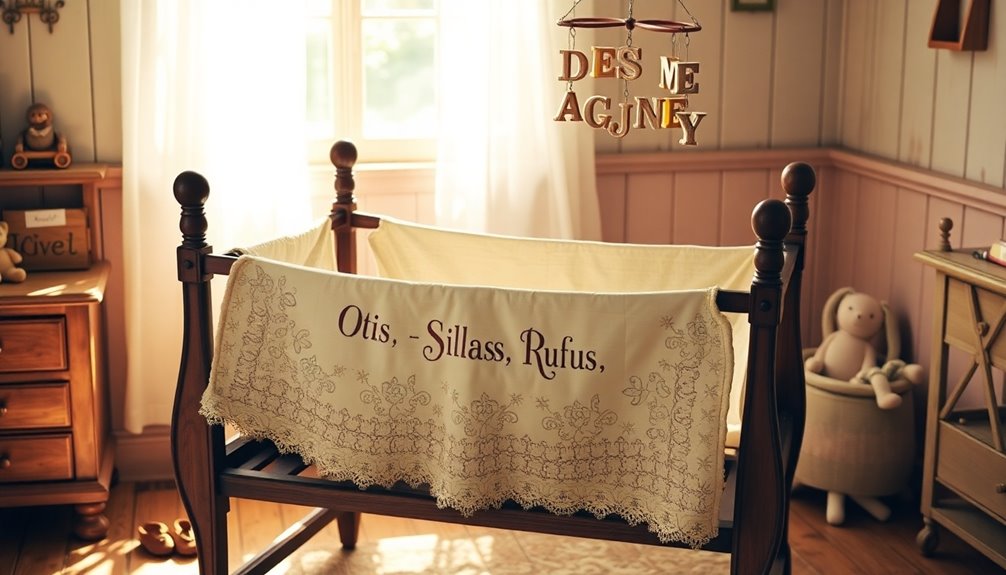
Amid the resurgence of unique and rare boy names, short and sweet options are gaining traction for their simplicity and charm. Names like Eli, Max, and Gus are perfect examples of Old-Fashioned Boy Names from the 1800s that are making a strong comeback.
These vintage names not only hold historical significance but are also appealing choices for modern parents who want to honor their heritage without the fuss of lengthy names.
The beauty of short names lies in their ease of pronunciation and memorability. Take Leo, for instance, which means "lion," or Sam, derived from Samuel, meaning "told by God." These names carry rich meanings while remaining approachable and stylish.
This trend aligns with today's preference for smooth-sounding names that are both memorable and trendy, as seen with names like Beau and Finn.
Additionally, pairing a short, vintage name with a longer, contemporary middle name creates a balanced and sophisticated choice for your baby boy.
Biblical and Hebrew Influences
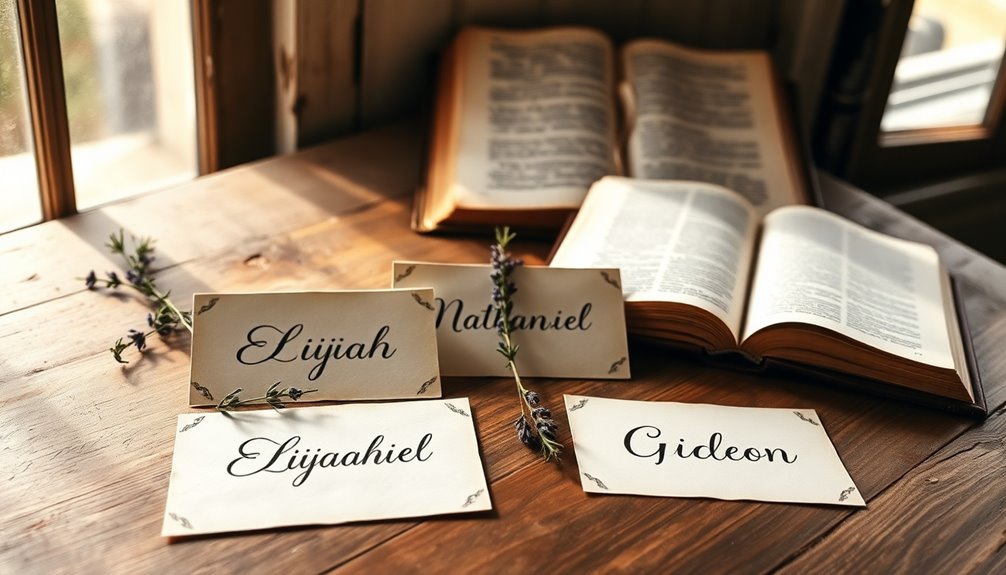
With their rich historical backgrounds and deep meanings, biblical and Hebrew names are making a significant impact in today's naming trends. You might notice names like Ezra and Hezekiah gaining popularity as parents seek names with strong religious significance. Vintage names such as Simeon, Jabez, and Enoch are also making a comeback, reflecting a desire to honor heritage while embracing unique connections to the past.
Here's a look at some of these compelling names:
| Name | Meaning |
|---|---|
| Samuel | "God has heard" |
| Gideon | "Hewer" or "one who cuts trees" |
| Hezekiah | "God strengthens" |
| Ezra | "Help" or "helper" |
The resurgence of biblical names enhances their appeal, with Samuel reaching its highest popularity since the 1890s. As you explore these names, you'll find many vintage options with Hebrew origins that carry deep meanings, adding a layer of significance. This trend reflects a broader cultural shift towards authenticity and individuality in naming practices, often inspired by rich historical narratives and familial connections, highlighting the importance of cultural intelligence in understanding diverse naming traditions.
Victorian Era Classics
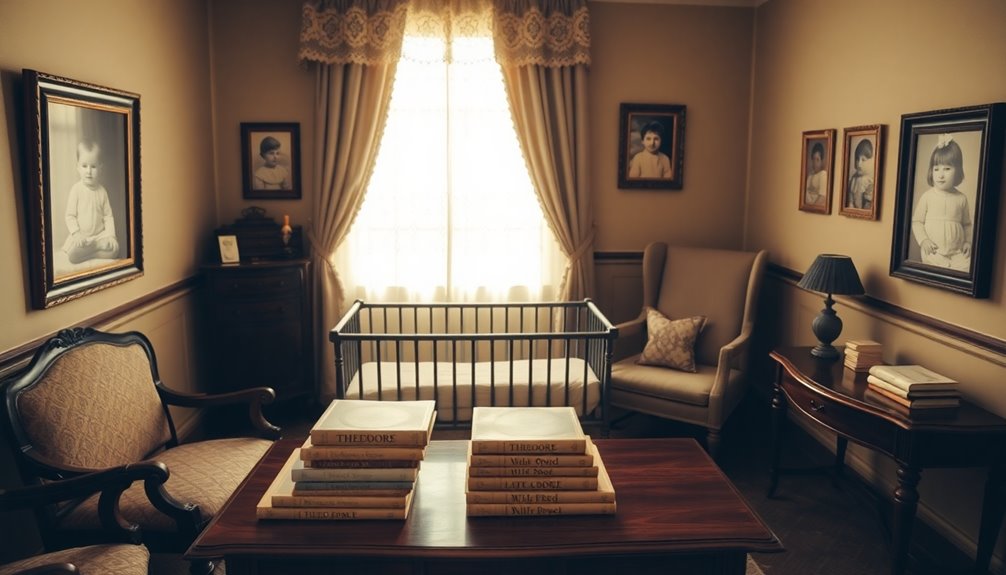
When you think of Victorian era classics, names like William and Henry come to mind, each carrying rich histories and meanings.
You might also consider unique choices like Cornelius or Percival, which are making a comeback as parents seek something distinctive.
These timeless names not only reflect a bygone era but also influence modern naming trends, blending tradition with a touch of originality.
Timeless Names and Meanings
As you explore the world of timeless names, Victorian-era classics stand out for their rich meanings and historical significance. Many classic names like William, Henry, and Charles have surged in popularity, resonating with modern parents who appreciate their enduring charm.
These boys' names evoke a sense of nostalgia, combining tradition with contemporary appeal. The name Theodore, for example, has emerged as a favorite, consistently ranking in the Top 10 since 2021. Its vintage feel and noble roots make it a strong contender for parents seeking timeless names.
Similarly, names favored by Queen Victoria, such as Albert and Arthur, continue to shape naming trends, highlighting the lasting influence of royal choices from the Victorian era.
You might also find lesser-known names from the 1800s, like Ambrose and Percival, appealing if you're looking for unique yet historically significant options.
These classic names not only carry deep meanings but also connect your child to a rich heritage. Embracing these timeless names can give your little one a sense of identity, rooted in the elegance and sophistication of the past. Additionally, the resurgence of retro names often reflects a broader cultural trend towards valuing heritage and tradition in modern society.
Unique Choices From History
While many parents gravitate toward popular Victorian-era names like William and Henry, a treasure trove of unique choices awaits those willing to explore deeper.
Consider names like Cornelius, Percival, and Livingstone. These old man names not only stand out but also carry a rich historical significance that connects you to the 1800s.
If you're searching for new names for boys, don't overlook lesser-known gems like Ewart and Feodore. These names offer a sophisticated flair, allowing you to embrace a traditional yet distinctive identity for your child.
Names favored by Queen Victoria, such as Albert and Arthur, also provide timeless options that resonate with many parents today.
The revival of old-fashioned names like Theodore and Ezra showcases the cultural nostalgia surrounding the Victorian period.
Influences on Modern Trends
Victorian-era classics have shaped modern naming trends in profound ways, influencing parents' choices with their timeless appeal. As you explore the resurgence of these names, you'll notice that old is new again. Names like William, Henry, and Charles remain popular, reflecting a collective yearning for nostalgia and historical significance.
Here are some key influences on modern trends:
- Rise of Vintage Names: Many parents now seek out names with an old-world charm, favoring those that evoke strength and character, similar to the way strong brand identity fosters loyalty in businesses. This trend mirrors the way celebrating relationships helps strengthen bonds within families. Additionally, the preference for these names can be linked to a growing awareness of financial health as families seek to create a stable and meaningful environment for their children.
- Historical Roots: Names such as Theodore, Ezra, and Arthur are making a comeback, aligning with the Victorian era's emphasis on meaningful choices.
- Royal Influence: Queen Victoria's preferences, including Albert and Leopold, continue to resonate, reminding us of the lasting impact of royalty on boys' names.
- The appeal of these names can be further understood through their connection to personality traits, showcasing how certain names may reflect desired qualities in children.
Trends in Baby Naming
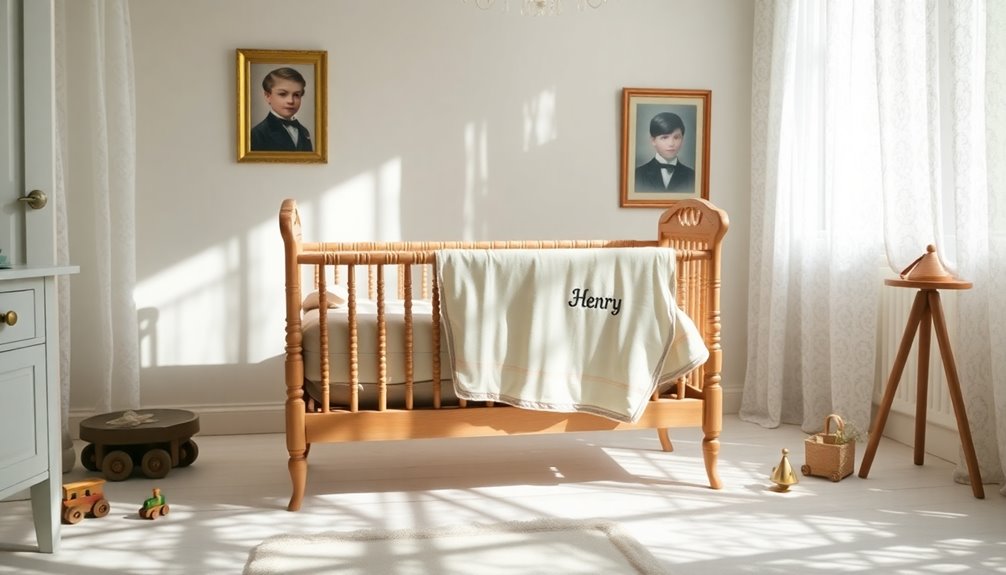
In recent years, many parents have embraced old-fashioned boy names, breathing new life into classics like Arthur, Theodore, and Henry. This resurgence reflects a broader trend in baby naming that leans towards vintage naming practices. Parents are increasingly drawn to names steeped in history, especially those from the Victorian era, as they seek to honor their heritage. This trend mirrors the concept of continuous learning and adaptation, as parents navigate the evolving landscape of naming conventions to find meaningful connections to the past. Additionally, many parents find comfort in choosing names that evoke a sense of emotional stability, which can be particularly significant in times of uncertainty. The popularity of these names can also be linked to the growing interest in sustainable practices that promote a deeper appreciation for lasting values. Furthermore, the emotional resonance of names can play a role in emotional regulation, helping children forge strong identities as they grow.
Here's a look at some notable trends:
| Trend Category | Examples | Popularity Drivers |
|---|---|---|
| Old-Fashioned Names | Arthur, Theodore, Henry | Heritage, nostalgia |
| Vowel-Driven Names | Eli, Ezra | Smooth-sounding appeal |
| Celebrity Influence | Oliver, Louis | Social media and public figures |
| International Appeal | Oliver, Louis | Blending old charm & modernity |
Social media and celebrity influences greatly impact these trends, propelling names like Oliver and Louis into the spotlight. This blend of historical significance and contemporary appeal showcases how vintage names are not just a passing fad but a meaningful choice for modern parents steering through the trends in baby naming.
Frequently Asked Questions
What Was a Popular Name in the 1800S for Males?
A popular name for males in the 1800s was William.
You'll find that it consistently ranked high in naming statistics throughout the century. This classic name has a timeless quality, making it a favorite choice for many parents.
Other common names included John and James, which also enjoyed widespread use.
If you're exploring names with historical significance, you can't go wrong with these enduring options that have stood the test of time.
Are Old-Fashioned Names Making a Comeback?
Yes, old-fashioned names are definitely making a comeback!
You might notice that many parents are choosing classic names that evoke a sense of nostalgia and heritage. Names like Arthur and Theodore are gaining popularity, reflecting a desire for individuality and unique sounds.
This trend highlights a broader societal shift towards valuing tradition and historical significance in naming.
What Is an Old Vintage Name for a Boy?
Picture a quaint library filled with leather-bound books, where names like Arthur and Theodore whisper tales of valor and wisdom. Now imagine stepping outside of the library, greeted by a serene pond with lilies floating on the surface. As the sun begins to set, the water reflects the colors of the sky, creating a magical ambiance. In this tranquil setting, one could almost believe in the power of mythical water names like Nixie or Undine, and the enchanting stories that surround them.
If you're searching for an old vintage name for a boy, consider choosing one that carries history and charm. Names like Henry or Franklin evoke a sense of nostalgia and elegance, linking your child to a timeless legacy.
These names stand out, offering a unique blend of classic roots and modern appeal.
What Is a Rustic Name for a Boy?
If you're looking for a rustic name for a boy, consider options like Jasper or Silas. These names evoke a sense of nature and simplicity, connecting your child to the great outdoors.
You might also like Rowan, which has strong natural associations. Names such as Otis and Rufus are making a comeback too, offering a unique charm.
Pairing these rustic names with modern middle names can create a balanced and memorable combination.
Conclusion
As you explore these charming old-fashioned boy names, remember that nostalgia can shape modern trends. Curiously, the Social Security Administration reported a 20% increase in the popularity of vintage names over the past decade. This resurgence reflects a desire for timelessness and connection to heritage. By choosing a retro classic, you not only pay homage to the past but also set your child apart in a sea of contemporary names. Embrace the charm of these names as you make your selection!

